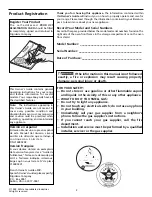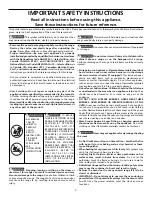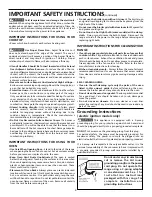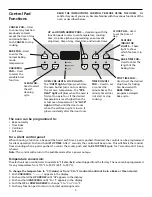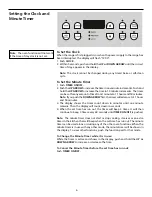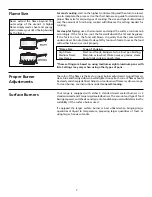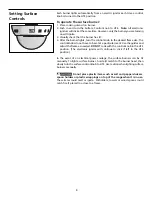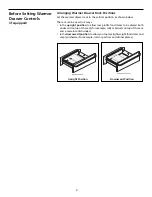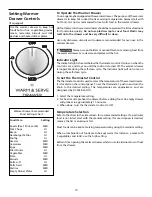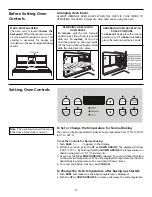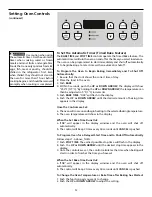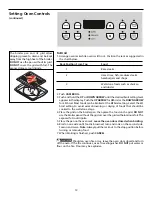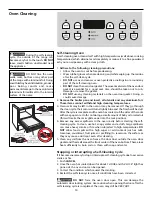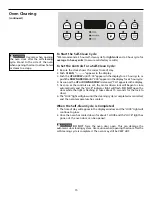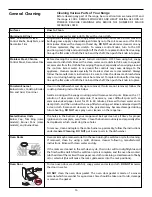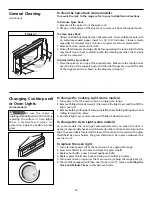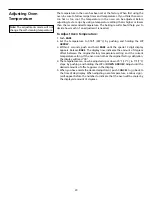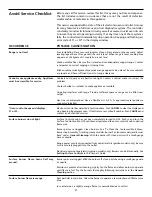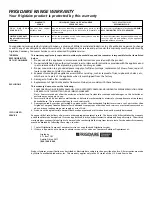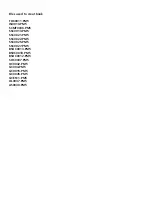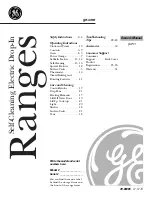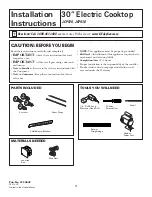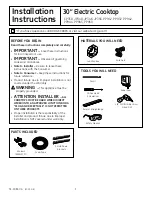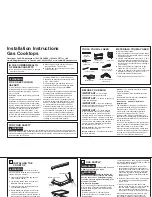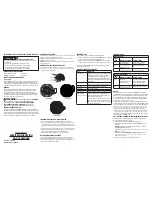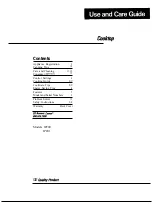
16
How to Clean
Use hot, soapy water and a cloth. Dry with a clean cloth.
For general cleaning
, use hot, soapy water and a cloth.
For more difficult soils and
built-up grease
, apply a liquid detergent directly onto the soil. Leave on soil for 30 to
60 minutes. Rinse with a damp cloth and dry.
DO NOT
use abrasive cleaners on any
of these materials; they can scratch. To remove control knobs, turn to the OFF
position; grasp firmly and pull straight off the shaft. To replace knobs after cleaning,
line up the flat sides of both the knob and the shaft; then push the knob into place.
Before cleaning the control panel,
turn all controls to OFF. Clean using hot, soapy
water and a dishcloth. Rinse with a clean water and a dishcloth. Be sure to squeeze
excess water from the cloth before wiping the panel; especially when wiping around
the controls. Excess water in or around the controls may cause damage to the
appliance. Cleaners made especially for stainless steel are recommended. Always
follow the manufacturer's instructions. Be sure to rinse the cleaners as bluish stains
may occur during heating and cannot be removed. To replace knobs after cleaning,
line up the flat sides of both the knob and the shaft; then push the knob into place.
Clean in the dishwasher and dry upon removal. If soils are not removed, follow the
cooktop cleaning instructions below.
Gentle scouring with a soapy scouring pad will remove most spots. Rinse with a 1:1
solution of clear water and ammonia.
If necessary
, cover difficult spots with an
ammonia-soaked paper towel for 30 to 40 minutes. Rinse with clean water and a
damp cloth, and then scrub with a soap-filled scouring pad. Rinse and wipe dry with
a clean cloth. Remove all cleaners or the porcelain may become damaged during
future heating.
DO NOT
use spray oven cleaners on the rangetop.
The holes in the burners of your range must be kept clean at all times for proper
ignition and a complete, even flame.
Clean the burners routinely and especially after
bad spillovers which could clog these holes.
To remove, clean and replace the entire burner cap assembly, follow the instructions
under
General Cleaning
.
DO NOT
put burner parts in the dishwasher.
Oven racks may be removed or left in the oven during the self-clean cycle for cleaning.
If removed, clean by using a mild, abrasive cleaner following manufacturer's
instructions. Rinse with clean water and dry.
If the racks are cleaned in the self-clean cycle, their color will turn slightly blue and
the finish will be dull. After the self-clean cycle is complete, and the oven has cooled,
rub the sides of the racks with wax paper or a cloth containing a small amount of baby
oil or salad oil (this will make the racks glide easier into the rack positions).
To clean oven door, wash with hot, soapy water and a clean cloth.
DO NOT
immerse
the door in water.
DO NOT
clean the oven door gasket. The oven door gasket is made of a woven
material which is essential for a good seal. Care should be taken not to rub, damage
or remove the gasket.
General Cleaning
Cleaning Various Parts of Your Range
Before cleaning any part of the range, be sure all controls are turned OFF and
the range is COOL. REMOVE SPILLOVERS AND HEAVY SOILING AS SOON AS
POSSIBLE. REGULAR CLEANINGS WILL REDUCE THE NUMBER OF MAJOR
CLEANINGS LATER.
Surfaces
Aluminum & Vinyl
Glass, Painted and Plastic
Control Knobs, Body Parts, and
Decorative Trim
Stainless Steel, Chrome
Control Panel, Decorative Trim
Porcelain Enamel
Burner Grates, Cooktop, Broiler
Pan and Grid, Door Liner
Sealed Burner Units
Burner Cap, Trim Ring (some
models), Burner Pans (some
models), and Burner Base
Oven Racks
Oven Door
Summary of Contents for FGF367CGSB
Page 23: ...23 ...

